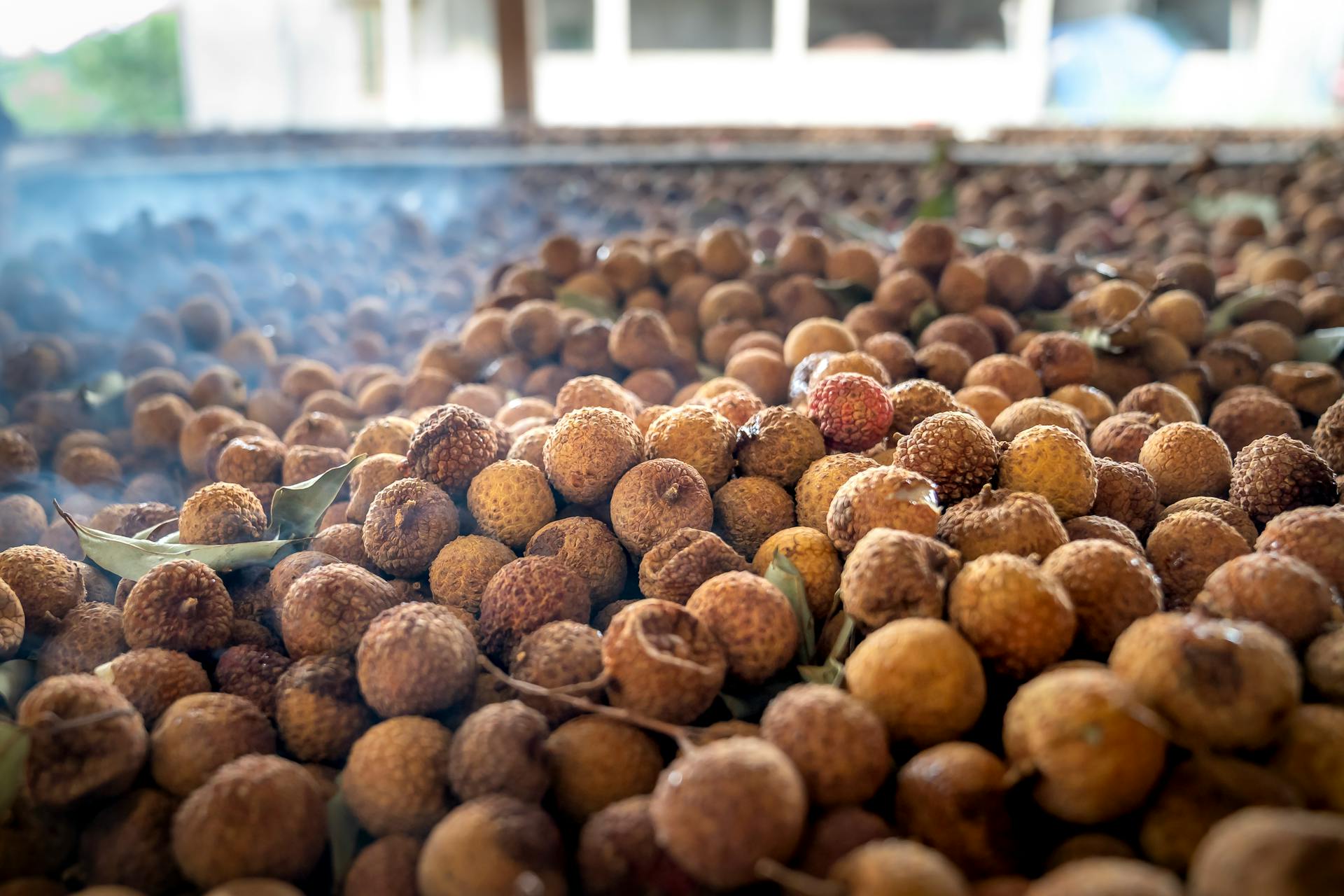
Onions and garlic are toxic to dogs because they contain a compound that can damage a dog's red blood cells, leading to anemia.
Dogs can't digest bones well, and eating them can cause obstruction or splintering, which can be painful and even life-threatening.
Raw or undercooked meat, especially pork, can contain Trichinella parasites, which can cause trichinosis in dogs.
Some dogs are highly allergic to beef, and even small amounts can trigger severe reactions, including itching, scratching, and skin lesions.
Dangerous Foods for Dogs
You should always keep an eye on what your dog is eating, but sometimes they can get into things they shouldn't. If you suspect your dog has eaten something toxic, call the ASPCA Animal Poison Control Center at (888) 426-4435 right away.
It's crucial to have the numbers of your local vet and the closest emergency clinic handy in case of an emergency.
Raw Meat, Fish
Raw meat, fish, and eggs are not as safe as you might think for your furry friend. Many vets discourage feeding raw meat to dogs due to the risk of salmonella and E. coli infections.
You might like: Risks of Feeding Raw Food to Dogs
Some vets recommend cooking raw food to kill off bacteria, but the majority still advise against it. Raw eggs have enzymes that can cause skin conditions in dogs, and raw fish can hide parasites that cause fatal diseases.
You can reduce the risks by freezing and proper preparation, but you need to learn how to handle raw food safely. Don't let your dog sneak unprepared meat off the counter or out of the garbage, as this can be disastrous.
Most infections happen to dogs with compromised immune systems, but it's hard to tell if your dog's immune system is completely healthy. If you're planning to switch to a raw diet, learn about proper food preparation to minimize the risk of bacterial or parasitic infection.
You might like: Raw Meat Make Dogs Aggressive
Chicken with Bones
Chicken with bones is a recipe for disaster, and I'm not just talking about the cooking method. Chicken bones are brittle and can splinter easily, especially when cooked.
Consider reading: Can Dogs Have Meat Bones
These tiny, sharp fragments can cause serious harm to your dog's digestive system, potentially puncturing the esophagus, stomach, or intestines.
Even larger chicken bones can get lodged in your dog's throat, leading to choking.
If you notice any unusual symptoms like coughing, sputtering, difficulty breathing, vomiting, or diarrhea in your dog after feeding them chicken, seek veterinary attention immediately.
And remember, just because your dog ate chicken bones before without issue doesn't mean they'll be okay the next time around. It's better to err on the side of caution and stick to boneless, skinless breast meat.
Processed and Cooked Meats
Processed and cooked meats can be hazardous for your dog. Hot dogs, for example, contain over 500 mg of sodium per serving, which can lead to bloating, vomiting, and even seizures.
Deli meats are also high in salt, making them a potential health risk for your dog. Consuming high amounts of sodium can cause a range of symptoms, from mild to severe.
Processed meats like hot dogs and deli meats often contain artificial sweeteners like Xylitol, which is highly toxic to dogs and can cause serious health issues, including death.
You might enjoy: Dog Food for High Energy Dogs
Meat Trimmings
Meat Trimmings can be a real hazard for our furry friends.
Fat trimmed from meat, both cooked and uncooked, can cause pancreatitis in dogs.
Bones can be a choking hazard and can also splinter and block or cause cuts in your dog's digestive system.
Processed Meats
Processed meats are a no-go for your furry friend. Bacon, hot dogs, and deli meats are all high in salt content, which can cause vomiting, diarrhea, tremors, high temperatures, and even seizures in dogs.
The high salt levels in processed meats can also lead to sodium-ion poisoning, which is particularly concerning in extreme cases. For example, consuming more than 1.5 grams of salt per pound of body weight can be lethal for dogs.
Processed meats are also packed with additives like monosodium glutamate (MSG) and preservatives like sodium-based nitrates and nitrites, which can increase the risk of sodium-ion poisoning. Additionally, many processed meats contain artificial sweeteners like Xylitol, which is highly toxic to dogs.
Hot dogs are a choking hazard, especially for larger dogs, and can cause serious health issues if swallowed whole. Deli meats, on the other hand, pose the risk of listeria, a bacterium that can cause foodborne illnesses in dogs.
Here are some facts about the dangers of processed meats for dogs:
Remember, it's always better to err on the side of caution when it comes to your dog's diet. Stick to lean, unprocessed meats and avoid sharing your breakfast bacon or hot dogs with your furry friend.
Chicken
Chicken is a popular ingredient in dog foods, but it's also a common allergen that can cause skin and gastrointestinal issues in dogs. Chicken allergies often appear as hotspots and can be misdiagnosed.
Severe itching and scratching, especially around the face, ears, and mouth areas, are common signs of a chicken allergy in dogs. Obsessive licking and biting of the paws or other areas can also be a symptom.
If your dog has a chicken allergy, the best treatment is to eliminate all chicken from their diet and feed only chicken-free dog food. Always reference the labels for an ingredients list.
It's essential to use clean, lean cuts of meat when feeding chicken to your dog. We recommend sticking to boneless, skinless chicken breasts, as they are lower in fats and easier to digest.
Never give your dog raw store-bought chicken, as it can pose a risk of bacterial infections from salmonella and Campylobacter bacteria. Always cook chicken thoroughly before feeding it to your dog.
Here are some safe cooking methods for chicken:
- Roasting
- Poaching
- Baking
- Grilling
Remember to never season the chicken with onions, garlics, or other seasonings, as they can be toxic to dogs.
Raw Eggs
Raw Eggs are generally considered safe for dogs in most cases, but some caution should be taken before feeding them to your dog.
Introduce raw eggs in small quantities when first offering them to your dog to alert you of any potential food allergies, reactions, or gastrointestinal food sensitivities that may upset their stomachs.
Seasonings should be avoided when preparing raw eggs for your dogs to consume because some seasonings can be toxic to dogs.
Proceed with caution, and always prioritize your dog's health and well-being.
Take a look at this: Deviled Eggs Bad
Frequently Asked Questions
What are the 10 most toxic foods for dogs?
Here's a concise FAQ answer: "Dogs should avoid the following toxic foods: onions, garlic, caffeine, alcohol, macadamia nuts, dairy products, bones, and excessive salt. Consuming these foods can cause a range of health issues, from mild stomach upset to life-threatening conditions
Sources
- https://www.webmd.com/pets/dogs/ss/slideshow-foods-your-dog-should-never-eat
- https://www.aspca.org/pet-care/animal-poison-control/people-foods-avoid-feeding-your-pets
- https://www.thekennelclub.org.uk/health-and-dog-care/health/health-and-care/a-z-of-health-and-care-issues/poisonous-food/
- https://dogtime.com/dog-health/dog-food-dog-nutrition/5504-bad-foods-for-dogs-list
- https://www.lcsupply.com/blogs/hunting-dog-supplies-reviews/meats-to-never-give-your-dog
Featured Images: pexels.com


